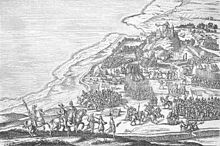Peace of Szczecin

The Peace of Stettin ( Swedish Freden i Stettin , Danish Freden i Stettin ) ended the so-called three - crown war on December 13, 1570 , which had taken place between the actually allies Sweden and Denmark as part of the Livonian War , the first of the Nordic Wars .
Result
There were no border shifts. The status quo was retained.
Frederick II of Denmark renounced his claims to Sweden , with which Denmark also formally recognized the dissolution of the Kalmar Union of 1523. Erik XIV of Sweden renounced his claims to Norway , Scania , Gotland and Halland . Sweden paid 150,000 riksdalers ( Reichstaler ) to Denmark for the return of the fortress Älvsborg near Gothenburg , which Denmark had conquered in 1563 .
The place of the peace treaty, Stettin , resulted from the fact that the peace negotiations were mediated by an imperial commission headed by Duke Johann Friedrich von Pomerania , and the city was his residence . He had assumed rule in Pomerania-Stettin due to the Jasenitz inheritance agreement of 1569.
The occasion of the war, the dispute over the crowns in the Danish coat of arms, was postponed: Both parties kept the three crowns in their coat of arms and undertook to resolve the conflict on this issue independently; should they fail to do so by January 1, 1572, it was agreed to appeal to an arbitration tribunal made up of the Rostock magistrate and the Rostock university .
The Baltic Sea trade of the Hanseatic cities under the leadership of Lübeck continued to lose importance.
Secondary results
The Pomeranian dukes also tried to use the negotiations to marry the still unmarried Danish king to a Pomeranian princess. This plan failed, however, not least because the Mecklenburg Duke Ulrich III , who offered himself as a negotiator . , instead of mediating the marriage to a Pomeranian princess, successfully brought up his own daughter Sophia .
See also
Web links
- Peace of Szczecin 1570 ( Memento of September 27, 2007 in the Internet Archive ) (Swedish)
- Contract texts. Leibniz Institute for European History . Retrieved June 29, 2016 .
Individual evidence
- ↑ Max von Stojentin: Jacob v. Zitzewitz, a Pomeranian statesman from the age of the Reformation. In: Baltic Studies NF 1 (1897), p. 143 ff.

